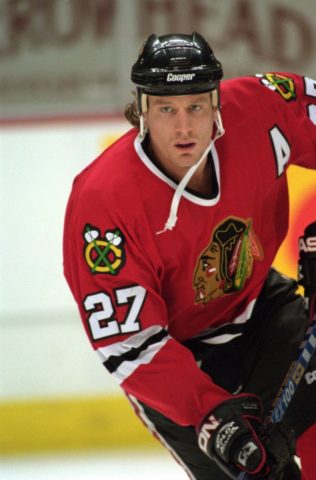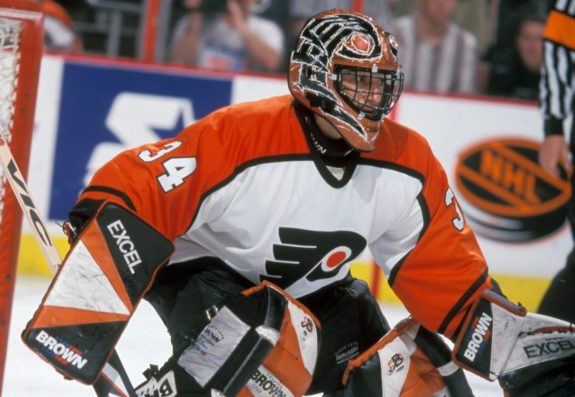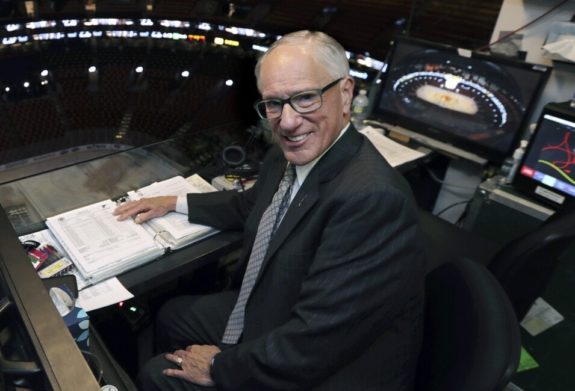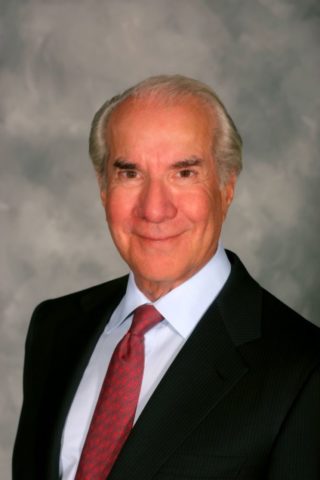The U.S. Hockey Hall of Fame honors some of the best Americans to ever contribute to the game. Like the Hockey Hall of Fame located in Toronto, Ontario, the U.S. association also selects and inducts a number of players and other personnel per year. Over the span of the association’s existence, there have been some who have been bestowed upon this honor who have also had at least a part of their career with the Philadelphia Flyers. Their contributions helped grow the game in the United States.
Mark Howe
Son of one of the best players in NHL history in Gordie Howe, Mark is statistically the best defenseman in Flyers history. He accumulated a total of 138 goals and 342 assists for 480 points in 594 games in the regular season between 1982-83 and 1991-92. In addition, he tallied eight goals and 45 assists for 53 points in a total of 82 games in the playoffs.
Related: Flyers Showdown – Lindros vs. Clarke
Howe started off his hockey journey as a forward instead of a defenseman. He began his professional hockey career with the Houston Aeros of the World Hockey Association (WHA). His father Gordie and brother Marty were also playing for the club at the same time as him. Mark had a stellar few seasons with the Aeros, helping the franchise win the Avco Cup (the Stanley Cup of the WHA) in back-to-back seasons (1974 and 1975). His stats in Houston are below:
- 1973-74: 38 goals and 41 assists for 79 points in 76 games
- 1974-75: 36 goals and 40 assists for 76 points in 74 games
- 1975-76: 39 goals and 37 assists for 76 points in 72 games
- 1976-77: 23 goals and 52 assists for 75 points in 57 games

Howe then went to the Whalers organization. The team was originally called the New England Whalers, but they moved to Hartford once the club joined the NHL after the merger with the WHA. It was during this time with the Whalers that Howe was switched to defense, and the rest was history. Howe eventually requested to be out of Hartford, and made his way to the City of Brotherly Love.
Internationally, Howe donned the Team USA sweater as a 16-year-old, helping the team win a silver medal in the 1972 Olympics (located in Sapporo, Japan). He was selected into the U.S. Hockey Hall of Fame in 2003.
John LeClair
John LeClair is remembered to Flyer fans for being a significant component to the Legion of Doom line alongside Eric Lindros and Mikael Renberg. He had produced some solid numbers before joining the Orange and Black. Selected by the Montreal Canadiens in the 1987 Draft, he played in five seasons with the club before being dealt to Philadelphia in a trade that also included defenseman Eric Desjardins and forward Gilbert Dionne for winger Mark Recchi and a 1995 third-round pick. LeClair posted the following numbers while with the Canadiens:
- 1990-91: two goals and five assists for seven points in 10 games
- 1991-92: 8 goals and 11 assists for 19 points in 59 games
- 1992-93: 19 goals and 25 assists for 44 points in 72 games
- 1993-94: 19 goals and 24 assists for 43 points in 74 games
- 1994-95: one goal and four assists for five points in nine games
One accomplishment LeClair achieved during his career was becoming the first American to notch three 50-goal seasons back-to-back-to-back. He did this all while with donning the Flyers sweater. He totalled 333 goals and 310 assists for 643 points in 649 games in the Orange and Black.

LeClair also represented Team USA in the Winter Olympics, both in 1998 (Nagano, Japan) and in 2002 (Salt Lake City, Utah), and was a key contributor both times he suited up for them. LeClair retired from playing in 2006. He posted 406 goals and 413 assists for 819 points in 967 games overall. He was inducted into the U.S. Hockey Hall of Fame in 2009.
Tony Amonte
Tony Amonte broke into the NHL with the New York Rangers in the early 1990s. He played in four seasons with the club before getting dealt to the Chicago Blackhawks during the 1993-94 campaign. To a degree, this move was bad luck for Amonte, as the Rangers went on to win the Stanley Cup later on that same season. Amonte, though, put up solid numbers alongside teammates like Jeremy Roenick, Eric Daze, and Chris Chelios among others while in Chicago.
- 1993-94: one goal and three assists for four points in seven games
- 1994-95: 15 goals and 20 assists for 35 points in 48 games
- 1995-96: 31 goals and 32 assists for 63 points in 81 games
- 1996-97: 41 goals and 36 assists for 77 points in 81 games
- 1997-98: 31 goals and 42 assists for 73 points in 82 games
- 1998-99: 44 goals and 31 assists for 75 points in 82 games
- 1999-00: 43 goals and 41 assists for 84 points in 82 games
- 2000-01: 35 goals and 29 assists for 64 points in 82 games
- 2001-02: 27 goals and 39 assists for 66 points in 82 games
After that, he spent part of a season with the Phoenix Coyotes before making his way to Philadelphia via trade. The official deal was Amonte for Guillaume Lefebvre, a third-round pick in the 2003 Draft, and a second-round pick in 2004’s Draft.
Amonte did not suit up for many games as a Flyer. He represented the team in 93 regular-season games. During that span, he chalked up 27 goals and assisted on 41. The highlight of his time in the City of Brotherly Love was being an asset in the club making it to the 2004 Eastern Conference Final against the Tampa Bay Lightning. The Bolts would beat them though, advancing and eventually winning the Cup against the Calgary Flames.
Amonte later left via free agency, signing a contract with the Flames, and he officially retired from the game in 2007. He was inducted into the U.S. Hockey Hall of Fame’s Class of 2009. He finished his career with 900 points in 1,174 games and had been honored during his time in the league with five straight All-Star Game appearances (1997-2001).
Derian Hatcher
Darian Hatcher joined the Flyers organization back in 2005, having just spent the previous season with the Detroit Red Wings. Hatcher mainly suited up for the Minnesota North Stars and Dallas Stars franchise where he was the captain from 1995 to 2003.
He put up the following stats while playing in both Minnesota and Dallas:
- 1991-92 (North Stars): 8 goals and 4 assists for 12 points in 43 games
- 1992-93 (North Stars): 4 goals and 15 assists for 19 points in 67 games
- 1993-94 (first season in Dallas): 12 goals and 19 assists for 31 points in 83 games
- 1994-95 (lockout shortened): 5 goals and 11 assists for 16 points in 43 games
- 1995-96: 8 goals and 23 assists for 31 points in 79 games
- 1996-97: 3 goals and 19 assists for 22 points in 63 games
- 1997-98: 6 goals and 25 assists for 31 points in 70 games
- 1998-99: 9 goals and 21 assists for 30 points in 80 games
- 1999-00: 2 goals and 22 assists for 24 points in 57 games
- 2000-01: 2 goals and 21 assists for 23 points in 80 games
- 2001-02: 4 goals and 21 assists for 25 points in 80 games
- 2002-03: 8 goals and 22 assists for 30 points in 82 games
Hatcher was able to help Dallas win it all in 1999, helping the Stars defeat the Buffalo Sabres, and clinch the franchise’s first Stanley Cup. In winning the Cup that year, Hatcher became the first captain from the United States to win the ultimate prize.
Becoming a free agent in 2003, the Red Wings inked the veteran defenseman to a big five-year contract worth $30 million. Unfortunately, injuries crept in early, and cost him basically the entire 2003-04 campaign. He was soon let go by the club in 2005 after the lockout.
Related: Hockey Documentaries to Watch Right Now
Hatcher suited up for his final few pro seasons with the Flyers. He signed a four-year contract with them and was later named captain of the team. He put up nine goals and 24 assists for 33 points in 203 games in the regular season while tallying a goal and four assists for five points in 21 postseason contests.
Hatcher retired in 2009, and was inducted into the U.S. Hockey Hall of Fame in 2010.
Jeremy Roenick
Before joining the Flyers, Jeremy Roenick played for the Chicago Blackhawks and the Phoenix Coyotes. He had already lit the offensive fire on multiple occasions, tallying 100 point seasons three times in a row. He notched 103 points during the 1991-92 campaign. Then, Roenick had 107 points in back-to-back seasons between 1992-93 (50 goals and 57 assists) and 1993-94 (46 goals and 61 assists). These big point production seasons mentioned were all with the Blackhawks.

Roenick left Phoenix to sign with the Flyers as a free agent. He only played in three campaigns with the organization, but produced significantly for them while he was there. On top of that, he helped lead the team to the postseason all three years. He put up the following regular season numbers for them:
- 2001-02: 21 goals and 46 assists for 67 points in 75 games
- 2002-03: 27 goals and 32 assists for 59 points in 79 games
- 2003-04: 19 goals and 28 assists for 47 points in 62 games
For the playoffs, he posted seven goals and 14 assists for 21 points in 36 games. The highlight of his tenure with the team, like in the case with his longtime career teammate Amonte, was making it to the Eastern Conference Final in 2004. They lost to the Lightning, but Roenick played his role perfectly as an offensive leader on that postseason run.
When the Flyers landed legend Peter Forsberg as a free agent in 2005, they needed to clear salary in order to stay within the cap. Roenick was the name the team decided to part with, dealing him and a 2006 third-round pick to the Los Angeles Kings for future considerations. He played a year in L.A. before returning for a season in Phoenix and then hanging up the skates after two years with the San Jose Sharks organization.
He left a mark as one of the best American scorers in the game. He retired having totaled 513 goals and 703 assists for 1,216 points in 1,363 regular-season games. In 154 playoff games, Roenick scored 53 goals and assisted on 69 for a total of 122 points. Alongside Hatcher, Roenick was inducted to the U.S. Hockey Hall of Fame in 2010.
John Vanbiesbrouck
John Vanbiesbrouck only played in Philadelphia for a few years but became one of the best American goalies of all-time. The man often referred to as “The Beezer,” had held the record for most wins by an American goalie, until longtime Buffalo Sabres goalie and current Anaheim Ducks’ backup Ryan Miller overcame the record.
Vanbiesbrouck started his NHL career as a New York Ranger and made some significant strides early on in his career. His first full season was in 1984-85, where he posted a record of 12 wins, 24 losses, and three ties. His goals-against-average (GAA) was 4.21, and his save percentage (SV%) was .879, with one shutout.
Related: Best Undrafted Players in NHL History
His second season was when he took off production-wise. He played in 61 games, winning 31, losing 21, and gaining five ties. His GAA was 3.33 and his SV% was .887, with three shutouts. He also played stellar in the playoffs, leading the team in 16 games. His postseason record was 8-8. He was awarded in the offseason with the Vezina Trophy.

After spending parts of eleven seasons with the Blueshirts and an additional five as a member of the Florida Panthers, Vanbiesbrouck signed with Philadelphia as a free agent. He had a decent run with the Orange and Black. He posted the following with them:
- 1998-99: 27 wins, 18 losses, 15 ties, 2.18 GAA, .902 SV%, and six shutouts
- 1999-00: 25 wins, 15 losses, 8 ties, 2.20 GAA, .906 SV%, and three shutouts
During his stint with the Flyers, Vanbiesbrouck eventually fell out of his role with the team, as they looked to goalie Brian Boucher as another answer between the pipes. In the offseason following 1999-00, Vanbiesbrouck was dealt to the New York Islanders for a fourth-round pick.
“The Beezer” played a short time with the Islanders before going to the New Jersey Devils. He played parts of two campaigns with the Devils, before retiring in 2002. He finished his career with 374 wins, 346 losses, 119 ties, a GAA of 2.98, a SV% of .899, and 40 shutouts. He was inducted into the U.S. Hockey Hall of Fame in 2007.
Gordie Roberts
Gordie Roberts came from a family that was super passionate about hockey. He was even named after Gordie Howe. He broke a couple of records while playing in the NHL, becoming the first player born in the United States to suit up for 1,000 games. He also represented Team USA in two World Championships and the 1984 Canada Cup.
Roberts was only in Philadelphia for a small sample of games during the 1987-88 year. He was acquired from the Detroit Red Wings for a fourth-round pick in the 1989 Draft. While with the team, he suited up in eleven games. During that time, he chalked up a goal and two assists. As quickly as he was in, he was out as the Flyers moved on from the defender. He was sent to the St. Louis Blues for a fourth-round pick in 1989.
Besides the Flyers, Roberts also represented the Hartford Whalers, Minnesota North Stars, the Blues, Pittsburgh Penguins, and Boston Bruins. He helped the Penguins capture back-to-back Stanley Cups in 1991 and 1992. He finished his NHL tenure with 61 goals and 359 assists for 420 points in 1,097 regular season games.
The U.S. Hockey Hall of Fame bestowed the honor of induction to Roberts in 1999.
Mike “Doc” Emrick
He is one of the voices of hockey. He can be heard on NBC’s nationally-televised games, and he is tradition calling the Stanley Cup Final alongside Eddie Olczyk with Pierre McGuire between the benches. Mike Emrick, also known as “Doc,” has been in the business for many decades now as a play-by-play. He has called games for different networks between NBC, Versus (now NBC Sports Network), ESPN, ABC, and FOX among others. His voice has also been heard for Winter Olympic hockey games.

He has won five Emmys for his broadcasts and was honored with the Foster Hewitt Memorial Award given by the Hockey Hall of Fame to a broadcaster for what he has been able to do for the game. He also won the Lester Patrick Trophy in 2004, which is awarded to someone for their contributions to hockey in the United States. Helping honor other greats in the sport, Emrick additionally served on the Hockey Hall of Fame and U.S. Hockey Hall of Fame committees who select the inductees.
Emrick had stints with individual teams as well for broadcasting. More recently he was the play-by-play for Devils games on MSG Network (before deciding to only go national), but he also worked on the Flyers TV broadcasting team from 1988 to 1993. He is also currently the vice president of the NHL Broadcaster’s Association, a position he has held since 1985.
Emrick has broadcasted for National Football League (NFL) games for a couple of years as well. He was inducted into the U.S. Hockey Hall of Fame in 2011. Overall, he is one of the best to ever call hockey games.
Ed Snider
To put it simply, without Ed Snider, there are no Flyers in Philadelphia, and hockey as a sport is not the same. He put in a bid for a hockey team, and the league rewarded him with a franchise in Philadelphia as part of the 1967 league expansion.
Related: The NHL’s Top 50 Russians of All-Time
He built the Flyers brand over the course of his life. He hired on hockey executives who helped lay out the blueprint for the Broad Street Bullies squads and eventually claiming two Stanley Cups in both 1974 and 1975. Snider played a role in all of the successes that the organization has had over the course of their history, up until his death in 2016.

His hockey impact went beyond just the Flyers though. Snider did what he could to advance the game of hockey in Philadelphia. He created the Ed Snider Youth Hockey Foundation for children who were less fortunate so that they could learn how to play hockey. The foundation also saved three rinks in the area that were on the brink of closing, so that the local kids could still go and play.
In 2011, Snider was inducted into the U.S. Hockey Hall of Fame along with “Doc” Emrick.
Putting American Stamp on the Game
Every one of these names has helped the brand of hockey in the United States. They all contributed and helped shape the game’s history over the years. A few of these names on the list, as previously mentioned, were not Flyers for large parts of their careers. However, the Flyer portions of their hockey journeys still count in what made them the talents that they were, and what got them this recognition. They will always be linked as some of the best this sport had to offer in the U.S.